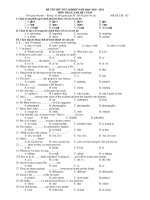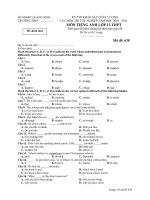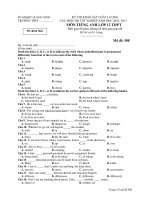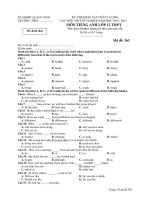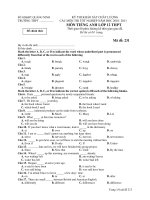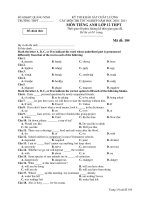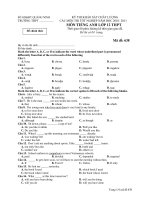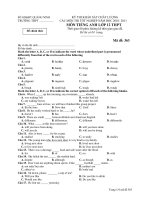Đề ôn thi tốt nghiêp năm học 2010- 2011 môn: tiếng anh potx
Bạn đang xem bản rút gọn của tài liệu. Xem và tải ngay bản đầy đủ của tài liệu tại đây (114.11 KB, 15 trang )
1
Së GD & §T L¹ng S¬n
Trường THPT Chi Lăng
§Ò «n thi tèt nghiªp n¨m häc 2010- 2011
m«n: tiÕng anh
(Thêi gian lµm bµi: 60 phót)
No. 1
Choose the word whose underlined part is pronounced differently from that of the others.
1. A. association B. original C. stability D. accelerate
2. A. fear B. bear C. clearly D. hear
3. A. church B. chemical C. choice D.cheaper
Choose the word whose main stress pattem is not the same as that of the others:
4. A. philosopher B. discriminate C. individual D. significant
5. A. preservation B. environment C. accessible D. conventional
Choose the word or phrase (A,B,C, or D) that best completes each sentence.
6. Most of us _____ hands to make our school clean and green as well as better than it used to be.
A. connect B. give C. share D. join
7. My father gave ____ smoking at the age ____ 45.
A. up/ of B. on/ for C. to/ on D. for/ at
8. She was worried about _____.
A. being robbed B. robbing C. being rob D. being robbing
9. The wedding day was ____ chosen by the parents of the groom.
A. careless B. careful C. carelessly D. carefully
10. “Let’s go to the New Star Resort this weekend.”
- “_____. How far is it from here?
A. It sounds well B. It sounds good
C. Sounds nicely D. Sounds well
11. Books are still a cheap way to get information and ____.
A. entertainment B. entertain C. entertaining D. entertainer
12. _____ actress’s life is in many ways unlike that of other women.
A. An B. A C. As D. That the
13. Everybody in the company agree that Henry was talented. _____, they didn’t choose him as
their manager.
A. Although B. However C. But D. Therefore
14. The more you practice, _____ you can speak the language.
A. the more well B. the better C. more better D. the more
15. – “Could I smoke in the room?”
- “I’d ____.”
A. you didn’t B. you don’t C. not D. not to
16. ____ someone is considered as rude.
A. Looking at B. Waving C. Greeting D. Pointing at
17. – “Is the Mona Lisa the most famous painting in the world?”
- “Yes, ______”
A. I think so B. I don’t think so
C. I think that D. I don’t think that
18. When I was first visited lorida, I _____ by the fact that so many people spoke Spanish there.
A. surprised B. was surprising
C. have been surprised D. was surprised
19. The bus always ____ here to pick up more passengers.
A. is stopping B. stops C. has stopped D. will stop
2
20. “Can you tell me how to get to the post office?”
- “Sure. _____ on the left”
A. Following the first turning B. Turn next
C. Take the first turning D. Take turns
21. If you _____ to my advice in the first place, you wouldn’t be in this mess right now.
A. will listen B. listened C. listen D. had listened
22. Did anyone ring me _____ I was out to lunch?
A. whereas B. since C. although D. while
23. One of the girls ____ in that company received the prize.
A. whose worked B. whom worked
C. worked D. who worked
24. The entrance examination to universities in Vietnam always ______ in July.
A. take care B. take place C. take notes D. take part
25. _____ you give me a lift home?
Yes, certainly. Wait for a minute. I __ get back soon. My car is in the parking lot over there.
A. Should/ can B. Will/ might C. May/ can D. Could/ will
26. We stayed at home last night ______ the bad weather.
A. because B. since C. as D. because of
27. I walked to the theatre, but Janice rode her bicycle.
A. intransitive/ transitive B. intransitive/ intransitive
C. transitive/ intransitive D. transitive/ transitive
28. Jane said, “I sent a letter to my brother.”
Indirect: Jane said that _____ a letter to _____ broher.
A. she has sent/ her B. she had sent/ her
C. I have sent/ my D. I had sent/ my
29. – I’m having the driving test tomorrow”.
- “_____”
A. Be careful B. Good luck C. Well-done D. Congratulations
30. The conical leaf hat is one of the typical features of the Vietnamese _____.
A. education B. culture C. society D. language
Read the passage below carefully and choose the correct answer A, B, C, or D:
Many years ago, people often said A woman’s place is in the home.” But Americans do not
feel that way any more. Today, women make up about 43 per cent of the America labor force.
There are about 45 million working women in the United States, and a large number of them are
married women with children. In 1980, for the first time in the nation’s history there were more
working wives than household wives. Looking back to 1940, we can see a picture of some very
rapid change. In 1940, only 15 per cent of married women held jobs.
Today, most young women choose to work even when they have young children. Why do
they work? The most important reason is that they need to earn money. But another reason is that
women today are better educated and they have more opportunities to work in various professions
than women had earlier.
31. What does this passage mainly discuss?
A. Women and jobs in America
B. Well educated women in America
C. More women than men in the labor force
D. The number of women who work outside the home
32. According to the passage, what is the percentage of men in the labor force?
A. 85 per cent B. 57 per cent C. 45 per cent D. 43 per cent
3
33. Which of the following is NOT true, according to the passage?
A. Women work because they want to make their own living.
B. Women play an important role in the labor force now.
C. The majority of working women are single.
D. Women have better schooling nowadays.
34. The word rapid in line 5 is nearest in meaning to ______
A. significant B. valid C. quick D. slow
35. What can be inferred from the passage?
A. Women need money more than education.
B. Young women do not get married in order to have jobs.
C. Women can work in many different fields.
D. The best place for women is in the home.
Choose the suitable word A, B, C or D to fill in each blank.
The United Nations Children's Fund, or UNICEF, was (36) _____ by the United Nations
General Assembly on December 11, 1946, to provide emergency Food and (37) _____ to children
in 'countries that had been devastated by World War II. In 1953, UNICEF became a permanent
part of the United Nations System and its name was shortened from the (38) _____ United
Nations International Children's Emergency Fund but it has continued to be known by the popular
acronym based on this old name. (39) _____ in New York City, UNICEF provides long-term
humanitarian and developmental assistance to' children and mother in developing countries.
UNICEF is currently focused (40) _____ five primary priorities: Child Survival and Development,
Basic Education and Gender Equality, including girl's education, Child protection from violence,
exploitation, and abuse, HIV/AIDS and children, and Policy advocacy and partnerships for
children's rights. Related areas of UNICEF action include early childhood development,
adolescence development and participation; life skills based education and child rights all over the
world.
36. A taken off B. set up C. paid on D. pushed back
37. A instrument B. projects C. work D healthcare
38. A. original B. ancestor C. old D. relatives
39. A. Managed B Led C Headquartered D. Committed
40. A. at B with C. on D. in
Find words or phrases that are not correct
41. We are advised not drinking the water in the bottle
A B C D
42. After she had sold her bicycle, she bought himself a new automobile
A B C D
43. Women's movements ensure the full education, develop and advancement of women.
A B C D
44. When I arrived at the school, all the students took part in the musical show had been there
A B C D
45. We had a long discuss about the problem but we couldn’t solve it
A B C D
Choose the best senence (A,B,C, or D) that is made from the words given.
46. heavy/ London/ fog/ cleared/ banning/ cars/ from/ city centre.
A. Heavy fog in London was cleared banning cars from the city centre.
B. The heavy fog London was cleared by banning cars from city centre.
C. The heavy fog in London was cleared by banning cars from the city centre.
D. The fog in London was cleared by banning cars from the city centre.
4
47. What/ you/ use/ Internet/ for?
A. What do you use the Internet for?
B. What do you use Internet for?
C. What do you do Internet for?
D. What do you use Internet?
48. boss/ insist/ everyone/ on/ be/ office/ nine ‘clock.
A. The boss insisted on everyone being on the office at nine ‘clock.
B. The boss insisted on everyone being in office at nine ‘clock
C. The boss insisted on everyone being of the office at nine ‘clock.
D. The boss insisted on everyone being in the office at nine ‘clock.
49. Taxi/not turn/ so we/ have/ walk/station.
A. The taxi didn’t turn up so we had to walk to the station.
B. The taxi didn’t turn down so we had to walk to the station.
C. The taxi didn’t turn up so we had walked to the station.
D. The taxi not turned up so we had to walk to the station.
50. I/study/ a school/ found/ nineteen century.
A. I’m studying at a school which found in the nineteen century.
B. I study at a school that founded in the nineteen century.
C. I’m studying at a school founded in the nineteen century.
D. I’m studying in a school which was founded in nineteen century.
The end
ANSWER KEYS FOR PRACTICE TEST 1
1. D 11. A 21. B 31. A 41. B
2. B 12. A 22. D 32. D 42. D
3. B 13. B 23. D 33. C 43. C
4. C 14. B 24. B 34. C 44. B
5. A 15. A 25. D 35. C 45. A
6. D 16. D 26. D 36. B 46. C
7. A 17. A 27. B 37. D 47. A
8. A 18. D 28. B 38. A 48. D
9. D 19. B 29. B 39.C 49. A
10. B 20. C 30. B 40. C 50. C
5
6
TRƯỜNG THPT CHI LĂNG
PRACTICE TEST 2
Choose the word whose underlined part is pronounced differently. Mark your choice on the
answer sheet.
1. A. social B. discuss C. instance D. police
2. A. representative B. general C. refreshment D. celebrate
3. A. damage B. luggage C. manage D. teenage
Choose the word whose main stress is placed differently from the others by circling the
corresponding letter A, B, C or D. Mark your choice on the answer sheet.
4. A. annual B. announce C. formal D. sculpture
5. A. maximum B. windowpane C. enjoyment D. organize
In the sentences, each one has four underlined words or phrases mark A, B, C and D.
Choose the one word or phrase that must be changed in order for the sentence to be correct
by circling letter A, B, C or D. Mark your answer in the answer sheet.
6. The people who waiting outside are becoming impatient.
A B C D
7. Tom said that he is going to leave for London the following day.
A B C D
8. There is a little time left so we must be as quick as possible.
A B C D
9. Although his old age, my grandfather is still young at heart
A B C D
10. You haven’t eaten anything since yesterday afternoon. You may be really hungry
A B C D
Choose the sentence (A, B, C, or D) which is grammatically correct and has the same or
nearly the same meaning as the original one.
11. Mr. Mills lost his job because he was late every day.
A. If Mr. Mills weren’t late every day, he wouldn’t lose his job.
B. The reason why Mr. Mills lost his job was that he was late every day.
C. Mr. Mills was late every day so losing his job.
D. Mr. Mills would have lost his job if he had been late every day.
12. Linda likes Paris very much,
A she is looking forward to going home, nevertheless
B. Therefore she decided to go back England as soon as possible.
C. However, she’s live there for along time.
D. Despite this, she hopes that she’ll be there some day.
13. It isn’t necessary that you go to work early tomorrow.
A. You needn’t go to work early tomorrow.
B. It’s necessary for you to go to work early tomorrow.
C. You shouldn’t go to work early tomorrow.
D. You must go to work early tomorrow.
14. Government/ enact / laws/ protect wildlife / commercial/ trade/ over hunting/
A. Government should enact laws protecting wildlife from commercial, trade and overhunting
B. Government should enact laws to protect wildlife from commercial, trade and overhunting
C. Government should enact laws to protect wildlife for commercial, trade and overhunting
D. Government enacted laws that protect wildlife for commercial, trade and overhunting
7
15. Britain/ people/ today/ are/ out/ in/ of/ many/ work/.
A. People in Britain are out of many work today
B. Today in may Britain people are out of work.
C. Many people in Britain are out of work today.
D. Many work are out of people in Britain today
These are incomplete sentences. Choose one best option to complete each sentence by
circling the corresponding A, B, C or D. Mark your choice on the answer sheet.
16. Yesterday, she borrowed many books ______ the library.
A. from B. of C. off D. with
17. It’s true that the stagnant economy has existed for a long time
A. slow B. developing C. sound D. statistics
18. Animals lose their habitat because of ________ and polluted environment.
A. thirst B. climate C. starvation D. deforestation
19. John failed again. He _______ harder.
A. must have tried B. should have tried
C. can tried D. may have tried
20. The government of our country started an overall _________ reform ten years ago.
A. economy B. economic C. economically D. economical
21. He performed very well in the interview; ________, he didn’t get the job.
A. since B. but C. therefore D. however
22. “Good morning. ___________”
- Yes, I’d like a new pair of shoes, please.
A. Could I help you? B. May I help you?
C. What are you buying? D. Do you need help?
23. They _________ on holiday twice this year.
A. went B. were C. have been D. have gone
24. The Simpson Desert was named _________ Mr. Simpson, President of the South Australian
Branch of the Royal Geographical Society of Australia.
A. with B. at C. after D. for
25. The early morning is the time __________ I work best.
A. which B. where C. in which D. why
26. “I’ve lost $500 dollars!”
- “___________”
A. Really? Thanks B. Good luck!
C. How annoying! D. I’m sorry to hear that
27. The Gibbon, Great Sandy, and Tanami Deserts comprise an enormous sandy area.
A. a lot of B. continuous C. very large D. very hot
28. More and more ___________are very excited about discovering as many interesting things in
the deserts as possible
A. explores B. explorations C. explorers D. exploratory
29. A: Would you please stay with us for lunch?
B: Sorry. I ______________. My children are waiting for me at home.
A. can’t B. wouldn’t C. mustn’t D. needn’t
30. The boy can’t reach the shelf ____ he’s not tall enough.
A. because B. although C even though D. and
31. A: “Good bye. Have a nice weekend”
B: “………………………………!”
A. Excuse me B. Nice to meet you
C. I’m sorry D. The same to you
8
32. When we arrived……… the station, the last train had gone.
A. in B. at C. for D. from
33. Farmers make their soil more productive by distributing _______.
A. fertile B. fertility C. fertilizers D. fertilizable
34. “Let’s go to Vung Tau on the weekend.”_ “_____________”
A. That’s a fine day B. That’s a good trip
C. Yes, please D. Yes, let’s
35. I have a lot of things ______ this morning.
A. that I have to do B. I have to do that
C. for that I do D. that to do
36. If one species become extinct, the whole chain will be seriously
A. disappeared B. killed C. damaged D. threatened
37. A: How much time do you spend reading books? B: _____________
A. Twice a week B. It’s 2 o’clock
C. Two hours a day D. Once upon a time
38. Almost half of turtles and tortoises are known to be threatened with ____.
A. extinct B. extinction C. extinctive D. extinctly
39. The government introduced some renovation measures to implement “DoiMoi”.
A. carry out B. produce C. bring D. support
40. Our parents advised us not to be when we were in trouble
A. supporter B. helpers C. optimists D. pessimists
Choose the item among A, B, C or D that best answers the question about the passage.
The nuclear family, consisting of a mother, father, and their children, may be more an
American ideal than an American reality. Of course the so - called traditional American family
was always more varied than we had been led to believed, reflecting the very different racial,
ethnic, class, and religious customs among American groups.
The most recent government statistics reveal that only about one third of all current
American families fit the traditional mold and another third consists of married couples who either
have no children or have none still living at home. Of the final one, about 20 percent of the total
number of American households are single people, usually women over sixty - five years old. A
small percentage, about 3 percent of the total, consists of unmarried people who choose to live
together, and the rest, about 7 percent, are single, usually divorced parents, with at least one child.
Today the varied family types are typical, and therefore, normal. Apparently, many Americans are
achieving supportive relationships in family forms other than the traditional one.
41. With what the topic is the passage mainly concerned?
A. The traditional American family. B. The nuclear family.
C. The current American family D. The ideal family.
42. The author implies that
A. there have been a wider variety of family
arrangements in the United States.
B. racial, ethnic, and religious groups have
presented the traditional family structure.
C. the ideal American family in the best
structure.
D. fewer married couples are having children
43. The world "current" in the second sentence of paragraph 2 could be best replaced by which of
the following?
A. typical B. present C. perfect D. tradition
44. According to the passage, married couples whose children have grown or who have no
children represent.
A. 33 percent of households B. 20 percent of households
C. 7 percent of households D. 3. percent of households
9
45. Who generally constitutes a one - person household?
A. A single man in his twenties. B. An elderly man.
C. A single woman in her late sixties. D. A divorced woman.
Choose the words or phrase among A, B. C or D that best fits the blank space in the
following passage.
Like any other university, the Open University can give you a degree. However, you don't
have to working to study. It can also open up a whole variety of interest. If you have never
studied before, you will enjoyed the special, new pleasure of increasing your knowledge. You will
make friends of kinds. You may also find that your qualification provides new career
opportunities.
You don't actually to Open University for lectures, but study at home, using television,
radio and computer software. You can one class a month if you wish at an Open
University centre. Of course, there are exams to take, as in any university. If you like to
know more, all you have to do is to complete the form below. It could be the start of a wonderful
new period in your life.
46.A. stop B. end C. break D. leave
47. A. all B. each C. both D. every
48. A. join B. enter C. arrive D. go
49. A. give B. attend C. learn D. study
50. A. did B. will C. would D. can
10
ANSWER KEYS FOR PRACTICE TEST 2
1. B 2. C 3. D 4. B 5. A 6. B 7. B 8. C 9. B 10. D
11. A 12. C 13. A 14. B 15. C 16. A 17. A 18. D 19. B 20. B
21. D 22. A 23. D 24. C 25. A 26. D 27. C 28. C 29. A 30. A
31. D 32. B 33. C 34. D 35. A 36. D 37. C 38. B 39. A 40. C
41. C 42. A 43. B 44. A 45. C 46. A 47. A 48. D 49. B 50. C
11
Practice test 3
I. Circle the word whose underlined part is pronounced differently from that the other
words.
1. A. advance B. cat C. matter D. chat
2. A. chair B. child C. cheap D. chemist
3. A. ocean B. cooker C. vacation D. candy
II. Circle the word which has a different stress pattern from that of the other three.
4. A. important B. comfortable C. surprising D. extinction
5. A. education B. opportunity C. investment D. international
III. Choose one best option (A, B, C or D) to complete each sentence below. Mark your
choice the answer sheet.
6. My father is a good cook. He is very good at ____ spring rolls.
A. makes B. making C. make D. to make
7. What is her brother’s ____? He is a computer programmer.
A. name B. work C. profession D. job
8. She has been very ____ during my illness.
A. supporting B. support C. supportive D. supported
9. A: “____ does your father have to do a night shift?”
B: “Twice a week.”
A. How often B. How far C. How long D. How old
10. English, ____ is my favourite subject, is spoken everywhere in the world.
A. that B. what C. who D. which
11. The director is leaving ____ Canada next week.
A. for B. at C. up D. to
12. I’ll give you my answer when I ____ you this Sunday afternoon.
A. to see B. see C. will see D. am seeing
13. The sun is shining, ____ Paula put on her hat,
A. but B. however C. so D. although
14. It is ____ an interesting book that I can’t put it down.
A. so B. such C. as D. too
15. Anne: “I don’t have my glasses. I can’t read them.”
Sue: “ ____.”
A. I’m going to read
it to you
B. I have read it to
you
C. I will read it to
you
D. I read it to you.
16. If he talked less, people ____ him more.
A. will like B. would have liked C. liked D. would like
17. Tom: “Let’s go to the pop concert tonight.”
Mary: “____.”
A. All right B. We are going C. We go D. Goodbye
18. Pupils must turn off ____ lights when they leave the rooms.
A. a B. an C. the D. Ø
19. I felt hot, so I ____ my coat.
A. put on B. took off C. gave up D. turned off
20. The noise was ____ that it frightened everyone in the hall.
A. too loud B. very loud C. so loud D. loud enough
21. I’d rather you ____ in my office.
A. don’t smoke B. wouldn’t smoke C. won’t smoke D. didn’t smoke
22. You can’t see her now. She ____ shopping.
A. go B. goes C. is going D. went
12
23. Nam: “____ is this machine used for?”
Tan: “It is used for sending fax.”
A. What B. How C. Who D. Why
24. The motivations for the birth of ASEAN were the desire for a _______ environment.
A. stable B. stability C. stably D. stabilize
25. The ASEAN Security Community (ASC) aims to ensure that countries in the region live at
_______ with one another and in a democratic and harmonious environment.
A. peaceful B. peace C. peacefully D. peaceable
26. The teacher told us ____ this exercise.
A. did B. do C. done D. to do
27. He tried to concentrate on his work _____ the noise.
A. because of B. in spite of C. although D. despite of
28. When we arrived, the children ____ “Hide and Seek”.
A. are playing B. have played C. were playing D. played
29. John had his bicycle ____ yesterday.
A. repaired B. repair C. to be repaired D. repairs
30. The higher one rises in the atmosphere, ____ the temperature generally becomes.
A. colder than B. the colder than C. colder D. the colder
IV. Read the passage and choose the best answer.
World Wildlife Fund (WWF) safeguards hundreds of species around the world, but we
focus special attention on our flagship species: giant pandas, tigers, endangered whales and
dolphins, rhinos, elephants, marine turtles and great apes. These species not only need special
measures and extra protection in order to survive, they also serve as “umbrella” species: helping
them helps numerous other species that live in the same habitats.
In addition to our flagship animals, we work to protect numerous species in peril around
the world that live within our priority eco-regions. Large predators like snow leopards and grizzly
bears, migratory species like whooping cranes and songbirds, and a host of other species facing
threats also benefit from WWF’s conservation efforts. Our wildlife trade experts at “traffic” work
to ensure that trade in wildlife products doesn’t harm a species, while also fighting against illegal
and unsustainable trade.
WWF is known for acting on sound science. Science leads and guides us strategies and
approaches, from the best way to restore tigers in viable, breed populations to decide which areas
need protection the most.
31. What does WWF stand for?
A. World Wildlife Food.
B. World Wildlife Formation.
C. World Wildlife Fund.
D. World Website Fund.
32. How many species do we pay much attention to?
A. 5 B. 8 C.7 D. 9
33. What is the meaning of the word habitats in paragraph 1?
A. The places where animals or plants are normally found.
B. The places where animals or plants can drink and sleep.
C. The places where animals or plants can eat and find their enemy.
D. The places where animals can find food and keep their body warm.
34. What can science help us in safeguarding endangered species?
13
A. Find the way to kill all species easily.
B. Lead and guide strategies and approaches.
C. Discover another habitat of animal.
D. Search for a food source for animals.
35. Which of the following is not mentioned in the passage?
A. WWF safeguards hundreds of species around the world.
B. WWF is known for acting on sound science.
C. These above species need extra protection so as not to be extinct.
D. All species are so fierce that scientists can’t take care of them.
V. Identify the word / phrase that must be change to make the sentence correct.
36. Computers are often used to control, adjustment, and correct complex industrial operations.
. A B C D
37. The man for who the police are looking robbed the bank yesterday.
A B C D
38. I’m fed up for you telling me what to do.
A B C D
39. The purpose of volunteer work is to help poor people how improving their life.
A B C D
40.These televisions are all too expensive for we to buy at this time.
A B C D
VI. Choose the suitable word to fill in each blank.
Deserts cover about one fifth of the Earth’s surface and occur where rainfall is less than 50 cm /
year. Although most (41)…………… , such as the Sahara of North Africa and the deserts of the
southwestern U.S, Mexico, and Australia, occur at (42)……… latitudes, another kind of desert,
cold deserts, occur in the basin and range are of Utah and Nevada and in parts of western Asia.
Most deserts have a considerable amount (43)……… specialized vegetation, as we as specialized
vertebrate and invertebrate animals. Soils often have abundant nutrients because they need only
water to become very productive and have little or no organic matter.
There are (44)………. few large mammals in deserts because most are not capable of storing
sufficient water and withstanding the heat. Deserts often (45)……… little shelter from the sun for
large animals. Mammals are usually small, like the kangaroo mice of North American deserts.
41. A. places B. countries C. beaches D. deserts
42. A. low B. hot C. wet D. cold
43. A. in B. of C. about D. over
44. A. likely B.mostly C. relatively D. partly
45. A. provide B. give C. express D. transfer
VII. Choose the sentence (A, B, C, or D) which is grammatically correct and has the same or
nearly the same meaning as the original one.
46. The last time I saw him was when I lived in London.
A. I didn’t see him since I lived in London.
B. I hadn’t seen him since lived in London.
C. I haven’t seen him since I lived in London.
D. I had last seen him when lived in London.
47. Women are better at running a home than men.
A. Men don’t run a home as well as women.
B. Women don’t run a home as well as men.
C. Men run a home better than women.
D. Women and men are all better at running a home.
48. How many books are you going to buy for your next school year?
A. How many books are you going to be bought for your next school year?
14
B. How many books are you going bought for your next school year?
C. How many books are you going to be bought for your next school year?
D. How many books are going to be bought for your next school year?
49. “I have lost my bike.” said Nga.
A. Nga told me to take her passport.
B. Nga said she had lost her passport.
C. Nga said her passport was new.
D. Nga advised me not to lose my passport.
50. Jack didn’t attend the class because he was seriously ill.
A. Jack’s class was not serious.
B. Jack never attended the class.
C. Jack was too ill to attend the class.
D. Jack was absent from class many times.
ANSWER KEYS FOR PRACTICE TEST 3
15
1.A 11.A 21.D 31.C 41.D
2.D 12.B 22.C 32.B 42.A
3.A 13.C 23.A 33.A 43.C
4.B 14.B 24.A 34.B 44.C
5.C 15.C 25.B 35.D 45.A
6.B 16.D 26.D 36.B 46.C
7.D 17.A 27.B 37.A 47.A
8.C 18.C 28.C 38.B 48.D
9.A 19.B 29.A 39.D 49.B
10.D 20.C 30.D 40.C 50.C
